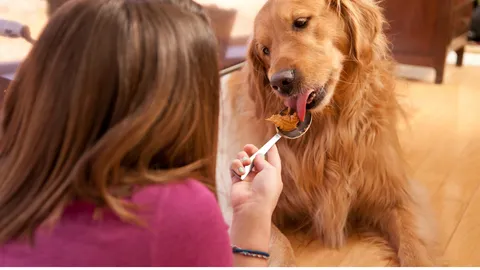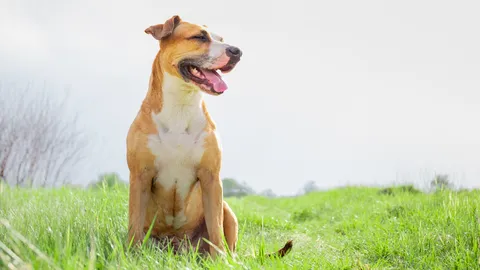Noticing your beloved canine companion becoming thinner can be a concerning experience for any pet owner. When your dog looks gaunt, and there haven’t been any significant changes to their routine or diet, it’s natural to worry about their health. Before exploring dietary changes, the most crucial first step is always to schedule an appointment with your veterinarian. A professional check-up can help determine if there are underlying health issues causing the weight loss. Once your vet confirms your dog is healthy, you can then focus on how to safely and effectively help your dog gain weight.
Understanding why your dog might be losing weight, or failing to put it on, is key to addressing the problem effectively. While some reasons are medical, others can be environmental or behavioral. Early identification and intervention can prevent further health complications. For instance, sometimes a dog might lose weight due to an illness, but other times, factors like stress or competition for food can play a significant role. If you notice your dog suffering from diarrhea, a lack of appetite, vomiting, or if they suddenly become lethargic, it’s important to seek veterinary attention promptly. Your veterinarian can also provide guidance if your dog is experiencing other health issues, such as what do dogs eat when sick.
Understanding Why Your Dog Might Be Underweight
Several factors can contribute to a dog’s inability to gain or maintain a healthy weight. Identifying the root cause is the first step toward finding an effective solution and ensuring your furry friend returns to their optimal health.
Health Issues
Medical conditions are a primary cause of unexplained weight loss in dogs. If your dog exhibits symptoms like persistent diarrhea, vomiting, or a sudden decrease in energy levels, these could be indicators of an underlying health problem. Conditions such as cancer, dental problems (which can make eating painful), diabetes mellitus, food allergies, gastrointestinal disorders, kidney disease, liver disease, megaesophagus, or parasites can all lead to significant weight loss. It is also common for dogs to lose some weight after giving birth and while nursing, or as they age. However, if this weight loss is extreme or persistent, and you can clearly see their ribs, it warrants a vet visit as soon as possible. Your veterinarian can perform diagnostic tests to identify and treat any medical conditions affecting your dog’s weight.
Stress
Just like humans, dogs can be affected by stress, which can lead to a drop in weight. Changes in their living situation, such as moving to a new home, the introduction of a new pet or family member, or a major change in their daily schedule, can all cause stress. A stressed dog might lose its appetite, leading to reduced caloric intake and subsequent weight loss. With patience and reassurance, most dogs will adapt to new circumstances, and their eating habits should normalize, helping them regain any lost weight. Creating a calm and predictable environment can significantly reduce stress levels in your canine companion.
Food Competition
In multi-dog households, food competition can be a subtle but significant reason why one dog is not gaining weight. If you have other dogs, especially those that are food aggressive or dominant, your underweight dog might not be getting enough to eat. Watch your dogs during meal times. If you observe their canine companions pushing them away from their food bowl or eating their portion, you might need to feed them separately. Ensuring each dog has a safe, quiet space to eat without competition can make a big difference in their caloric intake and overall weight.
Steps to Determine and Address Your Dog’s Weight Loss
To accurately understand and effectively address your dog’s weight loss, a systematic approach is essential. This involves careful observation, veterinary consultation, and reviewing their current diet.
Begin by paying close attention to your dog’s eating habits and bowel movements. Note how much they are consuming and if there are any changes in frequency or consistency of their bathroom trips. Next, assess their overall health and demeanor. Are they energetic and playful, or have they become more lethargic? These observations will provide valuable information for your veterinarian. A thorough check-up from the vet is paramount to rule out any medical causes. Once health issues are excluded, you can review your dog’s current diet. Check the recommended portion sizes on your dog food’s packaging and ensure you are feeding them enough. If necessary, consider switching to a higher-calorie, nutrient-rich, high-protein dry dog food or a premium raw dog diet to boost their caloric intake while preserving digestive health.
Effective Strategies to Help Your Dog Gain Weight
Once medical concerns have been ruled out by your veterinarian, you can focus on practical strategies to help your dog reach a healthy weight. These strategies typically involve adjusting their diet and ensuring they maintain appropriate exercise levels.
Dietary Adjustments
Helping your dog gain weight often comes down to providing them with the right kind of nutrition and sufficient calories.
Firstly, consider offering a brand of dog food that they genuinely enjoy. Some dogs are simply pickier eaters. Provide at least two meals a day, and if needed, introduce a third or even fourth small serving of their food to increase their daily intake without overwhelming their digestive system. Opt for foods that are naturally high in fat and protein, as these provide concentrated energy and support muscle development. Incorporating cooked sweet potato and pumpkin into their meals can add healthy calories and fiber. High-fat treats, especially given before bedtime, can provide an additional caloric boost. Additionally, adding a spoonful of peanut butter (make sure it’s xylitol-free) to their food can be a palatable way to increase calorie density.
 A Golden Retriever happily enjoying peanut butter from a person's hand, illustrating a high-calorie treat.
A Golden Retriever happily enjoying peanut butter from a person's hand, illustrating a high-calorie treat.
Exercise and Muscle Building
Contrary to what some might assume, reducing your dog’s exercise is generally not recommended when trying to help them gain weight. Regular physical activity is crucial for maintaining a healthy metabolism and overall well-being. It helps keep their system healthy and working properly, ensuring that the calories they consume are utilized effectively for muscle development rather than just fat accumulation. If an underweight dog has poor muscle tone, building up their muscles is as important as increasing fat. Feed them a healthy diet that provides a complete complement of amino acids to support muscle mass development. Daily exercise, ideally twice a day, is beneficial. Foods high in both protein and fat are excellent for this purpose. If your dog experiences joint pain, supplements can help reduce discomfort and encourage more activity. Remember to always provide plenty of water and allow for recovery time between exercise sessions, especially in hot weather.
Vet-Prescribed Diets
When your vet has given your dog a clean bill of health but they are still struggling to gain weight, your vet can play a crucial role in selecting an appropriate diet. Generally, they will suggest foods that are highly palatable, easy to digest, and packed with plenty of calories. The market offers a variety of specialized dog foods. Some are specifically formulated for dogs that won’t gain weight, others are designed for specific age groups, and some cater to working dogs that burn a lot of extra calories. Collaborative discussions with your veterinarian will help you identify the best food option tailored to your dog’s specific needs, ensuring they receive balanced nutrition for healthy weight gain.
What Can a Dog Eat to Gain Weight: Best Foods for Healthy Weight Gain
When it comes to helping your dog gain weight, selecting the right foods is paramount. Focus on nutrient-dense options that provide ample calories, protein, and healthy fats to support their body.
Commercial Dog Food
The foundation of any dog’s diet should be high-quality commercial dog food. When trying to encourage weight gain, check the label on your current dog food. You’ll want to ensure that it provides plenty of protein and fat. Compare the nutritional information with other brands, looking for higher percentages of these key macronutrients. Protein is essential for building and maintaining muscle mass, while fat provides a concentrated source of calories that dogs need for energy throughout the day. In addition to their main meals, look for treats that are also high in protein and fat. Options like dried chicken, salmon, beef, kangaroo, or lamb are excellent choices. Always ensure that protein is the first ingredient listed. Just like with their regular food, read the treat labels carefully to be certain you’re giving them the healthiest and most beneficial snacks.
Safe Human Foods to Supplement Your Dog’s Diet
While commercial dog food should be their primary diet, there are several healthy human foods that can be safely added to your dog’s meals for an extra caloric boost and added nutrition. These can be particularly helpful for picky eaters or dogs that need a little extra encouragement to eat. Options include cheese (in moderation), chicken liver, cottage cheese, fish oil, peanut butter (xylitol-free), pumpkin, raw meats (if prepared safely and sourced responsibly), sweet potato, and tuna (packed in water, not oil). You can either mix these into their existing kibble or raw food, or offer them as nutritious snacks between meals. Most of these foods are highly appealing to dogs, making them a good option even for the fussiest eaters. However, it’s crucial to remember that these should only be supplements and not replace their balanced dog food, as relying solely on human food can inadvertently lead to nutritional deficiencies.
Ensuring Healthy Weight Gain: A Holistic Approach
Your dog is a cherished member of your family, and ensuring their well-being, including a healthy weight, is a top priority for any loving pet owner. Few things can cause more concern than seeing your furry friend lose weight and appear listless. Unless the cause is immediately obvious, such as recent strenuous activity or a minor dietary change, it is always best to consult with your veterinarian as soon as possible. A professional diagnosis is crucial to rule out any serious underlying health issues that could be impacting their weight.
If your dog receives a clean bill of health, then you can focus on implementing lifestyle and dietary adjustments to help them regain a healthy physique. Make sure you are providing a brand of dog food that they genuinely enjoy, as palatability can significantly impact intake. Supplement their diet with healthy, high-calorie treats distributed between meals. Crucially, ensure meal times are calm and free from stress or competition, especially in multi-pet households. Maintaining a stable daily schedule can also reduce anxiety and encourage consistent eating. By combining a tailored diet with consistent, appropriate exercise and plenty of love and affection, you can help your dog put the weight back on and enjoy a long, healthy life by your side. Explore more articles on dog health and nutrition on Dog Care Story to continue providing the best care for your pet!
 A smiling white and tan dog enjoying an outdoor environment, emphasizing a healthy, active lifestyle.
A smiling white and tan dog enjoying an outdoor environment, emphasizing a healthy, active lifestyle.
References:
